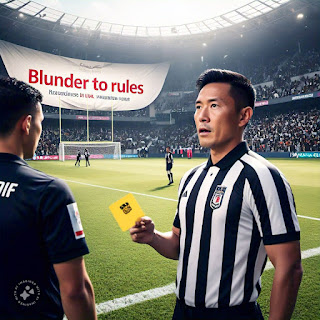From Blunders to Brilliance: The Top 10 Modern Football Rules That Reshaped the Beautiful Game
Football, the beautiful game, has witnessed its fair share of controversies and debates surrounding refereeing decisions over the years. In the pursuit of perfection and fairness, the governing bodies of football have introduced several new rules to address human errors on the field. In this article, we'll explore ten pivotal rule changes that have reshaped the game, acknowledging the sportsmen, referees, and influencers who played crucial roles in their implementation.
1. VAR (Video Assistant Referee):
The introduction of Video Assistant Referee (VAR) in the 2018-2019 season marked a turning point in football officiating. Spearheaded by former referees Pierluigi Collina and Massimo Busacca, along with football legend Marco van Basten, VAR was designed to rectify egregious errors in critical moments. This technological advancement allows referees to review decisions using video footage, ensuring a higher degree of accuracy in game-changing situations.
2. Goal-Line Technology:
In the 2012-2013 season, Goal-Line Technology was introduced following the infamous "ghost goal" incident involving Frank Lampard during the 2010 World Cup. The call for technological assistance gained momentum after former referee Jorge Larrionda's advocacy, ensuring that the ball crossing the goal line is accurately determined, reducing controversies surrounding disputed goals.
3. Handball Rule Modification:
Inspired by Thierry Henry's infamous handball incident during the 2009 UEFA World Cup play-off, the Handball rule underwent significant changes in the 2019-2020 season. FIFA President Gianni Infantino championed the modification, leading to a revised rule that considers accidental handballs in the build-up to a goal, providing more clarity to referees.
4. Concussion Substitutes:
In response to player safety concerns, the 2020-2021 season saw the introduction of concussion substitutes. Influenced by Ryan Mason's serious head injury in 2017, the global players' union, FIFPRO, advocated for a safer approach. This rule allows teams to make additional substitutions when a player suffers a concussion, prioritizing player health over tactical considerations.
5. Captain's Challenge:
The concept of a Captain's Challenge, trialed in various leagues during the 2022-2023 season, aimed to empower team captains and reduce referee errors. The Referee Advisory Panel, which includes experienced officials and players like Jordan Henderson, explored the feasibility of allowing teams a limited number of challenges per match to dispute decisions.
6. Offside Rule Tweaks:
Arsène Wenger, known for his managerial success, transitioned into a role with the International Football Association Board (IFAB) and proposed changes to the offside rule. The modification, implemented in the 2021-2022 season, now focuses on a player's body parts that can play the ball, aiming to eliminate marginal offside decisions that were a frequent source of controversy.
---
7. Temporary Dismissals (Sin Bins):
The 2017-2018 season saw the introduction of temporary dismissals, or sin bins, to address persistent misconduct without disrupting the flow of the game. Former referee David Elleray and the Dutch Football Association played pivotal roles in implementing this rule, allowing players to serve short-term suspensions for offenses like dissent.
8. Substitution Limitation:
Concerns over time-wasting and tactical disruptions led to discussions about limiting the number of substitutions during a match. Influential managers like Jurgen Klopp and Pep Guardiola advocated for this change, leading to its implementation in the 2021-2022 season and forcing teams to be more strategic with player changes.
9. Attacking Player Handball Exemption:
To address controversies arising from unintentional handballs leading to goals, the Attacking Player Handball Exemption was introduced in the 2020-2021 season. Roberto Rosetti, the chairman of IFAB, played a crucial role in clarifying that an attacking player unintentionally touching the ball with their hand or arm in the build-up to a goal would not be penalized.
10. Penalties for Coaches' Misconduct:
The 2018-2019 season saw the introduction of penalties for coaches' misconduct to address instances of excessive behavior on the sidelines. Renowned managers Jose Mourinho and Antonio Conte advocated for measures to curb such behavior, ensuring a more respectful environment during matches.




Comments
Post a Comment
leave a comment, like and share...